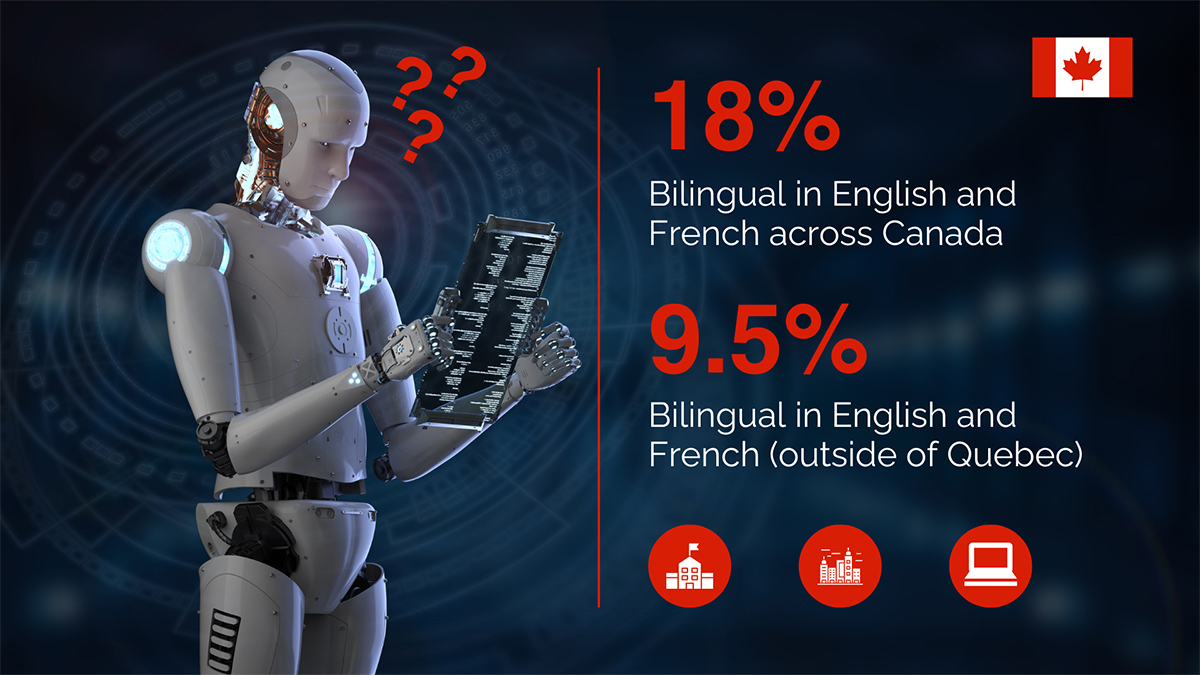 Can AI help us find those elusive Bilingual English/French job candidates we’ve been searching for, since it often feels like we’re trying to pinpoint a needle in a haystack? Why not leverage data analysis at scale to help us, right?
Can AI help us find those elusive Bilingual English/French job candidates we’ve been searching for, since it often feels like we’re trying to pinpoint a needle in a haystack? Why not leverage data analysis at scale to help us, right?
We are with you! And we are excitedly experimenting with AI every day too.
The challenge however is that AI hasn’t yet learned some of the specific strategies that we employ in our Bilingual English/French search processes to find hidden skilled talent among today’s vast ocean of jobseekers.
Many new clients come to us feeling really frustrated after they’ve exhausted all of their options in trying to find Bilingual English/French talent on their own. Data from Statistics Canada (StatsCan) gives us a glimpse into why this is the case.
Today, less than one-in-five people across Canada (18%) say they can have a conversation in both English and French. When Quebec is removed from the equation, this figure from 2021 drops down to just 9.5%. In 2001, this statistic was 10.3%.
Imagine that you are searching for Bilingual English/French job candidates for your company today. Of all the talent in the marketplace who meet the specific skills and job qualifications you need, statistically, only one-in-ten from that group could fulfill the role in both English and French. That figure will drop even further, when you consider hiring for a great cultural fit and team cohesion, etc.
It’s no wonder that HR professionals and hiring managers are struggling with Bilingual English/French recruitment!
Can AI help? In theory, yes. However, AI programming to date appears to be squarely focused on key word searches, zooming in on skills needed for a position, job titles, etc. If a candidate doesn’t use the keyword “French” or “Bilingual” however (which, surprisingly, many Bilingual English/French candidates don’t always include), AI will miss those profiles altogether.
Today, AI is still approaching Bilingual English/French in a flat, 2-dimensional manner – essentially, thinking quite literally. It’s missing some critical logic, and depth of knowledge that comes from amassing years of in-field practice.
Here are a few things that we do differently at BlueSky Personnel Solutions for example, that AI hasn’t quite figured out yet:
- We search for Bilingual English/French job candidates on mainstream platforms: LinkedIn, for example, is one of our go-to destinations because the vast majority of talent (including Bilingual English/French candidates) frequent this platform in English. Some clients assume that posting their job opening on a French-only job board will reach Bilingual English/French candidates. But in truth, fully bilingual jobseekers don’t go to those websites! Often the people who are lacking somewhat in their English skills frequent those sites.
- We search for graduates from various schools: After years of doing Bilingual English/French talent searches, we’ve come to know which schools across key global markets, produce graduates with exceptional Bilingual English/French language skills. So, we pull profiles of jobseekers in Canada who have studied in those schools as part of our search strategy.
- We search for talent who have lived and worked in a city where French is primarily used in business environments: We seek out talent living in Canada today, who may have lived in other countries and cities where French was the default language at work. Oftentimes, we find candidates who may be currently working in a unilingual capacity in English, but who speak French fluently. We know they can seamlessly transition into a Bilingual position for our clients.
- We help our clients across Canada tap into the Bilingual English/French talent pool in Quebec: If the pandemic has taught businesses anything over the past few years, it is that remote work works. For many of our clients, it has proven to serve as a smart business model, especially when expanding nationally. Having Bilingual English/French employees enables companies to serve their customers in both official languages. And the one highly positive news from StatsCan’s latest study (noted above) is that in Quebec, the rate of English-French Bilingualism has impressively risen, from 40.8% in 2001 to 46.4% in 2021.
In all of the scenarios above, we find AI is currently missing the mark through their search algorithms. In addition, and perhaps most importantly, because our entire team is fully Bilingual in both English and French, we test for language skills from the very beginning of the pre-screening process.
This helps our English-speaking clients save a lot of time and heartache, in terms of dealing with candidates who exaggerate their French speaking skills beyond what they are realistically capable of (which happens much more often than you may think). Again, AI hasn’t mastered this detection strategy to replace human-to-human testing.
We are deeply passionate about this recruitment work, and our long client tenures (often lasting decades) reflect the value and impact of our services.
In fact, if we can take a moment to share some good news with you: Our very own Julie Labrie, president, BlueSky Personnel Solutions, was just named the Best Canadian Bilingual Recruitment Expert 2024 (Canada) by the Acquisition International (AI) Influential Businesswoman Awards. These global awards based in Europe, honour “the outstanding achievements of female business leaders across multiple industries.” We accept this award with a lot of gratitude and pride.

If your organization is in search of Bilingual English/French talent, feel free to reach out to our team today. It would be our pleasure to assist you in finding your perfect “needle in a haystack.” You can reach us by phone at: 416-236-3303, or via email at: [email protected]. We look forward to connecting with you!